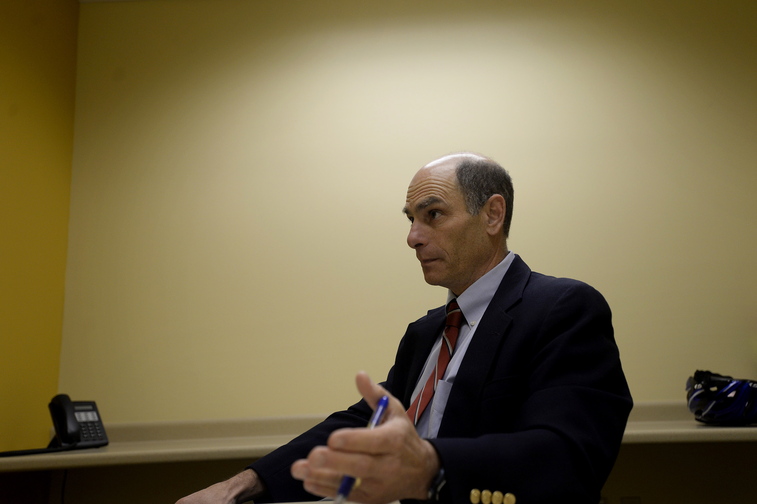PORTLAND — Pamela Manning’s lawsuit accusing her former Westbrook employer, Kohl’s Department Stores Inc., of discriminating against her for being a diabetic is one of the first few federal court cases in Maine to be put on hold because of the government shutdown.
The U.S. Department of Justice and the federal courts remain open, but Manning is represented in her case by attorneys with the Equal Employment Opportunity Commission, federal employees who have been furloughed.
“EEOC lawyers are prohibited from engaging in any litigation activities in the present circumstances,” her lead attorney, Adela Santos, said in a motion to continue Manning’s case, filed last week in U.S. District Court in Portland.
The delay in that case and other civil cases in Maine’s federal courts, where U.S. attorneys have already started filing motions for delay, could be the start of an effort to postpone more cases if the congressional standoff in Washington continues beyond this week. That’s when the courts’ funding runs out. If the shutdown continues, the federal court and offices may have to start triaging their caseloads, focusing their efforts on criminal cases involving violent crimes and arrests, but putting on hold civil cases and less time-sensitive cases.
The move would come on top of budget cuts that the federal courts in Maine have already seen as a result of sequestration earlier this year, which they weathered by not filling open positions, laying off some staff and putting off technology upgrades.
Attempts to reach Manning through her attorney were unsuccessful. Santos’ phone at her New York City office went straight to voice mail, and an email to Santos generated an automated email response:
“Due to the lapse in appropriations for the federal government, I am on furlough and I am unable to work. I will not be available to respond to your email until the federal government has been funded.”
The federal judiciary, which oversees federal courts in the District of Maine, has enough money to fund operations through this week. After that, the courts would have to restrict operations to a bare minimum and possibly require staffers to work without being paid.
The clerk of U.S. District Court in Maine, Christa Berry, has said that starting next week, the court will have to cut back operations. Berry said she doesn’t expect to announce the court’s final plan until later this week. But attorneys in other civil cases in Maine have already started filing motions to halt court proceedings.
The U.S. Attorney’s Office has filed motions to delay at least two pending civil matters in which its lawyers represent one side: One is a lawsuit filed by a Princeton resident who slipped on snow and fell outside the Indian Township Health Center, in which the United States, the Passamaquoddy Tribe and the center are defendants. The other is a case in which the U.S. Department of Agriculture has intervened to enforce a $78 million judgment by a Maine state court against the Chicago owners of the Elsemore Estates housing development in Dixfield.
Federal courts are required by law to speedily process criminal matters, with or without funding, but civil cases fall under different rules. U.S. Bankruptcy Court will also continue processing cases, even without funding, and employees would be expected to work without pay.
Thomas Delahanty II, U.S. Attorney for the District of Maine, said his office will continue to prosecute violent crimes and cases in which there are arrests regardless of how long the shutdown continues, but other types of cases might have to be considered on a “case by case basis.”
“On the civil side, we are in the process of filing motions to continue and asking the courts for extensions to deadlines. If they are not approved by the courts, we would have to address those cases,” Delahanty said. “On the criminal side – and this could change (this) week – they are handling cases as normal.”
Even before the shutdown, federal courts were bracing for a second wave of budget cuts as a result of other congressional inaction. Sequestration, which cut funding across all levels of federal government, first went into effect March 1. As part of the government shutdown debate, Congress was considering a new budget for fiscal year 2014 that could include even more cuts.
U.S. District Court in Portland and Bangor has seen a staff reduction of nearly 20 percent since 2010, although it has so far avoided layoffs. The staff shrank from 27 employees in 2010 to 22 now through attrition and early retirements.
In that same time, the court saw an increase in criminal cases, from 201 new defendants in 2010 to 277 in 2012. The number of civil cases has declined from 577 filings in 2010 to 431 in 2012, according to Berry.
“The work hasn’t changed. If somebody is out sick, it is getting harder and harder to get the work done,” she said. “If we cut any more people, it’s going to really negatively impact our ability to help the judges with these cases.”
To retain staff after the sequestration cuts earlier this year, Berry said the court postponed scheduled technology improvements and used that money to pay salaries.
The U.S. Attorney’s Office is part of the Department of Justice, which has a much larger capital budget that can be used to offset cuts than the Administrative Office of the U.S. Courts, which supports the operations of the judicial branch. That office funds the U.S. District Court, the federal defender office, U.S. Bankruptcy Court and U.S. Probation and Pretrial Services.
“We are being hit hard by budget cuts,” said Alec Leddy, clerk of the U.S. Bankruptcy Court in Portland and Bangor. “The bankruptcy court in Maine had never laid anybody off for budget reasons, but we did this year.”
The bankruptcy court in Maine recently laid off three of its 19 employees, leaving six staff members in Bangor and 10 in Portland, in addition to two judges and four judicial staff members. In 2012, the court filed or reopened 3,053 bankruptcy cases.
The federal defender office in Maine is the smallest in the country, with only five full-time staff members and two part-time staffers, split between Portland and Bangor.
The federal defender office represents people charged with a federal crime who cannot afford their own attorney. The cases it can’t handle are assigned to private defense attorneys from a court-approved panel, whose pay was cut on Sept. 1 from $125 to $110 per hour.
Federal defender David Beneman said that in response to budget cuts, he has opted not to rehire a receptionist, runs the office without a paralegal and has cut training, technology and office supplies to swallow a $125,000 cut, about 20 percent of his budget, imposed by sequestration. But Beneman said he needs the same budget in fiscal year 2014 to make ends meet.
“If we don’t have the same as we had, we are going to lose people or lose an office,” said Beneman, and closing an office would mean the end of public defender services in Bangor.
“It is way too expensive to cover Bangor from Portland or Portland from Bangor, so we don’t do it,” he said.
Scott Dolan can be contacted at 791-6304 or at:sdolan@pressherald.comsdolan@pressherald.comTwitter: _fcksavedurl=>Twitter: @scottddolan
Send questions/comments to the editors.




Success. Please wait for the page to reload. If the page does not reload within 5 seconds, please refresh the page.
Enter your email and password to access comments.
Hi, to comment on stories you must . This profile is in addition to your subscription and website login.
Already have a commenting profile? .
Invalid username/password.
Please check your email to confirm and complete your registration.
Only subscribers are eligible to post comments. Please subscribe or login first for digital access. Here’s why.
Use the form below to reset your password. When you've submitted your account email, we will send an email with a reset code.